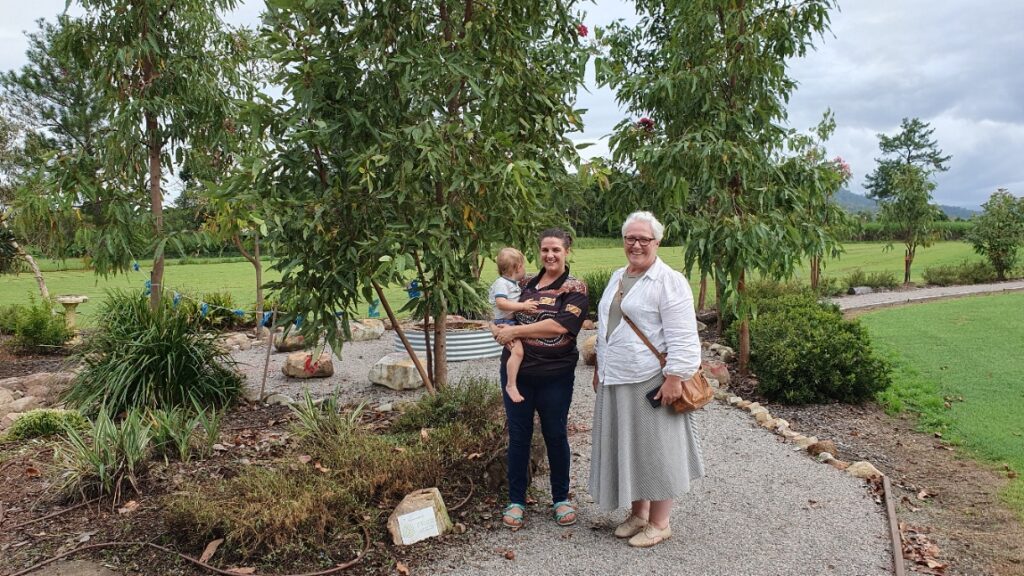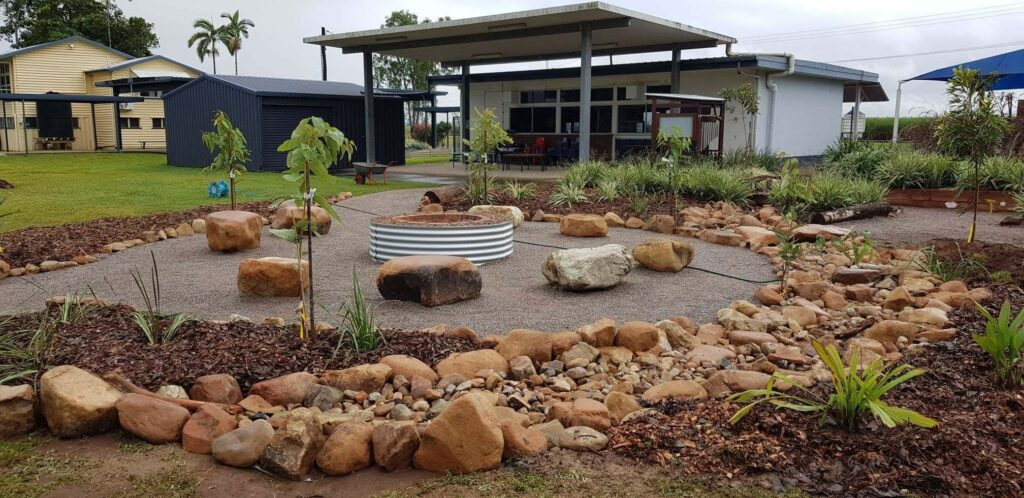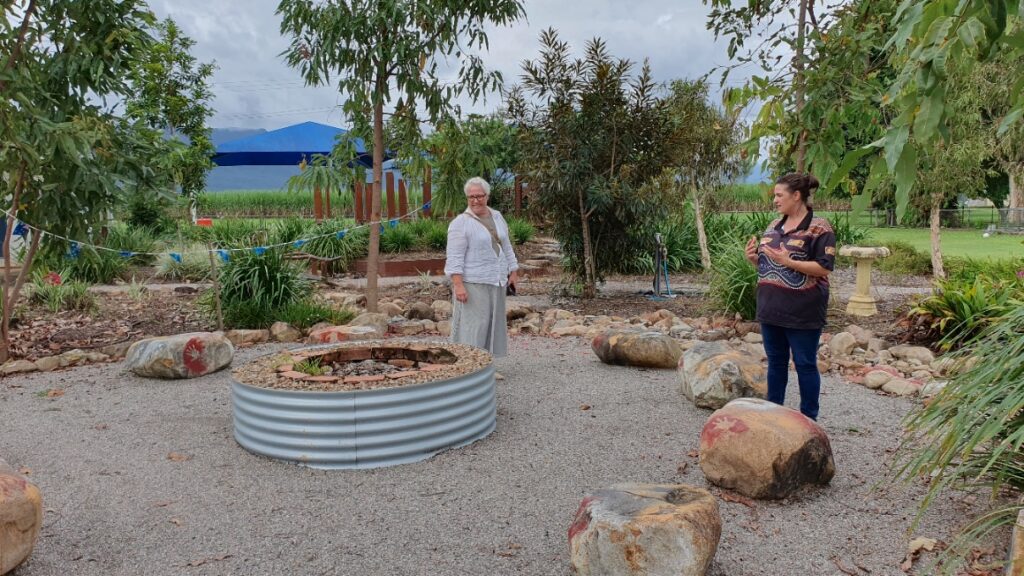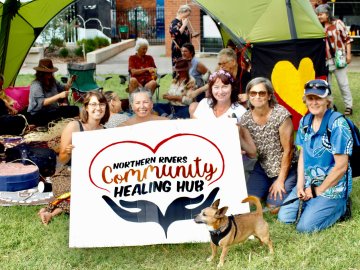Foundation for Rural & Regional Renewal (FRRR)
The small town of Abergowrie, on the lands of the Warrgamay people, is a thriving farming community located 40 km north-west of the township of Ingham in north QLD. The small but vibrant Abergowrie State School is one of 100 Queensland schools with fewer than 20 students and plays an important role as a hub for the broader community, with facilities used as a disaster recovery centre, polling place, community library, along with hosting preschool playgroups, social events and community activities.
With strong ties to local history, the school community regularly looks for ways to foster new partnerships, strengthen existing relationships and promote community connections. Encouraging cultural diversity and awareness is a priority for the school community, understanding that promoting an open and welcoming learning environment strengthens wellbeing, both within the school grounds and more broadly across the community. To achieve this, integrating spaces and experiences within the school that reflect cultural connection is vital, to both students, families and others.
To create an inclusive and culturally appropriate space, the Abergowrie Primary P&C Association (APP&C) applied for funds through the Strengthening Rural Communities program to deepen cultural understanding and community engagement through the building of a landscaped Yarning Circle. The volunteer run APP&C plays an important role promoting parent participation and encouraging collaboration between parents, students and the local community to achieve the best educational outcomes and learning experiences for the children in a fun and safe environment.



The Warrgamay people are the traditional custodians of the land that Abergowrie State School resides on and the APP&C Association wanted the Yarning Circle to reflect their culture and spirit. Yarning circles have been used by Australia’s First Nations peoples for centuries and are a place of honesty, trust, respect and safety where every person in attendance is equal. They’re used to teach new generations about the past and engage them with culture for the future.
To ensure the project was culturally respectful, the school community engaged two Aboriginal Elders of the Warrgamay people to help deliver the project. The Elders offered to help shape the design of the Yarning Circle and provided guidance on ways the Yarning Circle could be used by the school and the community. They also helped plan cultural aspects into the design of the Yarning Circle, including paintings and artwork. Lead by the Elders, the students were involved in this part of the project providing a cultural learning experience and encouraging them to taking ownership of the Yarning Circle creation.
True to the spirit of collaboration, the primary school also drew on the close ties with nearby St Teresa Secondary College, which promotes rich and diverse cultural learning programs for young people with an Aboriginal and Torres Straight Island background. St Teresa College provided cultural knowledge and expertise to the project, and the space continues to be used for shared experiences between the schools.
The $10,000 grant, which was funded by The Yulgilbar Foundation, paid for the materials and services of the landscaper and builders. With the project costing more than the requested amount, the APP&C negotiated ways to reduce the overall cost, which involved local donations of materials and a community working bee. With many hands on-deck, the project was completed over a weekend. Those helping included students, school parents, grandparents, teaching, cleaning and ground person staff, Warrgamay Elders and community members. The APP&C shared with the FRRR team that it was a fun, rewarding weekend that connected all of those involved.
The completed Yarning Circle is set among gardens with native trees providing shade and a beautiful, calm setting. When termites were discovered on the site, impacting the materials that could be used as seating around the fire pit, challenges were viewed as opportunities with timber logs swapped for large natural rocks, fitting in with the Australian bush setting seamlessly. A fire pit was built in the centre of the Yarning Circle using kiln-fired bricks, with a lid that’s placed over the pit when it’s not in use to create a functional surface.
By building this space, the APP&C hoped to encourage confidence and resilience in students and foster an attachment to culture and their surrounding environment.
Since completion, the Yarning Circle area has brought people together for the official opening smoking ceremony, dances, informal gatherings, and has been incorporated into student learning. Abergowrie Primary School P&C continues to encourage the community to be involved in social activities and events where the Yarning Circle plays an integral role. Through the creation of this inclusive, culturally appropriate space, the broader community can continue to be involved in community conversations in a safe and accepting environment to encourage connections and ties to community, place and self, as the comments below attest.
“Through this project, the community created a space in the school that has brought people of all walks of life together. During construction, there were discussions of absolute excitement between all involved, and in particular between the school parents and teaching staff and the Warrgamay Elders. These talks were full of energy and openness on how this space will be the platform that will bring cultures together and make us all a stronger group of people. I speak as a parent of three girls who attend Abergowrie State School when I say that I am filled with joy to be working with members of the Warrgamay people and knowing that my children will be a part of this collaboration. The Warrgamay people have an abundance of passion for sharing their cultural knowledge and being part of our school’s journey. This I am very proud to be a part of.”
“We are very grateful for the Aboriginal Elders’ involvement and excitement towards this project and feel that this could truly become a place of significance in the Abergowrie community.”
“For small schools like ours, it is very challenging for our P&C to make a significant contribution to the learning experience of our children. Grants like this make it possible for our parent community to really contribute to our kids’ journey through school.”
Yarning and other culturally-informed models of health can support people in the community to explore factors that impinge on social-emotional wellbeing (SEWB) and co-create solutions for individual and family wellbeing, including young people.
(Murrup-Stewart et al, 2021)
The Northern River Community Healing Hub is a network of local Indigenous and non-Indigenous volunteers who practice a range of culturally informed trauma-integrated healing modalities including weaving circles, art therapy and bodywork (massage). The hub was established following the catastrophic 2022 flood event in the Northern Rivers.

They received a grant for $24,570 through the Rebuilding Futures program, funded by the Suncorp Group to support the hub practitioners to grow and develop their work through increased service delivery moving from an entirely volunteer model to a hybrid paid / volunteer operation. NRCHH is available to all people, regardless of cultural background with a focus on their target population: Aboriginal and Torres Strait Islander people, children and young people, families, including older people. The project also included Mobile Hub operations to enable better access to the service within communities themselves – where they need them most, and in consultation with community.
The healing practice activity funded by the project has directly benefitted 639 people across the community at outreach to the pod villages of Coraki and Lismore, and tents at the Nimbin Aquarius Festival and Murwillumbah Kinship Festival, and workshops for a Queer Flood Recovery Event and an event for school children. In addition there have been weekly sessions at the Healing Hub including: 15 bodywork sessions per week free to the community; free flowing drop in weaving / yarning circle on Wednesdays; and clay art therapy once a week.
The NRCHH has evolved through the project. The paid / volunteer mixed model has been successful and they are now seeking input and collaboration that will deepen partnerships and relationships with the organisations that they currently work with to continue.
Project Manager Ruth Rosenhek said, “At the Healing Hub, we provide a de-clinicalised, informal soft-texture gentle space to support healing for our community that focuses on the whole person including a phenomenally successful bodywork program that runs alongside cultural activities such as weaving and yarning circles, creative arts and community connection. We have found that 18 months past the 2022 flood events, people continue to be managing high levels of stress and trauma. These cultural activities that involve sitting on country, slowing down the pace, connection and belonging are all powerful healing agents.”

